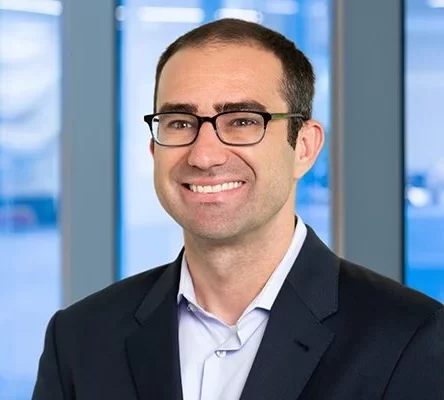

Speakers

Omar A. Escontrías, DrPH, MPH
By the time Dr. Omar Escontrías joined the National Health Council in April 2022 as its Vice President of Research, Education, and Programs, he’d already spent decades building a career fighting systemic health care inequalities in historically underrepresented and racial/ethnic (HURE) communities.
Born in the northern México border community of Ciudad Juárez, Dr. Escontrías is a proud first-generation immigrant, boasting his bilingual and bicultural background as one of his greatest strengths.
Dr. Escontrías was six years old when he immigrated to the United States with his mother, settling in Tucson, AZ. Tucson quickly became a beloved second home to Dr. Escontrías, attending the University of Arizona where he would earn three degrees, including a Master of Public Health in Epidemiology, and a Doctorate in Public Health Policy and Management in 2019.
Dr. Escontrías also made an impact outside of the classroom, joining the nation’s first Latino fraternity and quickly taking on a leadership role with Lambda Theta Phi
Latin Fraternity, Inc. This would spark a new chapter in his life as an organizer for volunteer outreach projects and grassroots advocacy.
In 2009, Dr. Escontrías joined the Centers for Disease Control and Prevention, working in the Obesity Prevention Branch as a research fellow, and specializing in childhood obesity, specifically in HURE youth.
From there, he returned to Arizona, this time serving as an Infectious Disease Epidemiologist at the Arizona Department of Health Services (ADHS) from 2010 to 2012 and then managing the Diabetes Prevention and Control Program from 2012 to 2017. This work would also lead Escontrías into a long-running relationship as a senior member of the Arizona Diabetes Leadership Council and Coalition. Dr. Escontrías’ tenure at ADHS focused on scaling diabetes management and prevention programs for the vulnerable across the state.
Dr. Escontrías then made the move to Washington D.C., serving as the Senior Director of Policy Research for the American Dental Education Association (ADEA) from 2017 to 2021. At ADEA, he published multiple policy research reports, peer-reviewed journals, and policy briefs to advance dental education.
Escontrías had by now spent years directly observing the social, cultural, and linguistic barriers faced by Hispanic/Latinx communities across the country and began looking for a new opportunity to help improve minority access to comprehensive health care coverage.
That search soon led Escontrías to the NHC, where he was impressed with its 2022 to 2024 strategic plan, especially those areas of focus regarding the advancement of health ecosystem policy reforms to optimize patient health and prioritizing health equity across the health ecosystem.
Backed up by his wealth of bicultural experiences, from his earliest days as a child in México, to his years organizing community outreach projects, Dr. Escontrías is thrilled to be contributing to the NHC’s patient-centered advocacy and policy engagement efforts.

Eric Gascho
Eric Gascho is the Senior Vice President, Policy and Government Affairs. He has been with the National Health Council since August 2009. In his role, Gascho leads the National Health Council’s advocacy efforts by working with its member organizations to develop policy positions that seek to improve the lives of people with chronic diseases and disabilities and advocating for these policies on Capitol Hill and within the executive branch. He also represents the NHC in the national media, the broader health care community through public speaking engagements, and in coalitions. Gascho serves on the Steering Committee of the Partnership to Protect Coverage and the NIH’s PCOR Chronic Conditions Monitoring Board.
Prior to joining the NHC, he worked in the government relations department of the Society of Teachers of Family Medicine.
Gascho earned his BA degrees in government and business management from the University of Redlands in California.

Matt Kazan
Matt Kazan advises health plans, life sciences clients, and patient organizations as they navigate the policy landscape, focusing on Medicare Part D and Medicare Advantage, and implementation of the Inflation Reduction Act.
In recent projects, Matt helped life sciences companies understand and prepare for the IRA’s impacts on their products by organizing internal workshops with cross-functional teams to help clients align on IRA response strategies and providing data analytics to support those strategies. Matt has also helped manufacturers plan CMS engagement strategies so they can influence the IRA’s implementation. During congressional debate over the IRA, Matt also supported clients seeking to engage members of Congress by providing data, legislative text, and supporting materials to help clients deliver persuasive policy arguments to key members. Matt also provides leadership for Avalere’s Policy Edge subscription product, which surveys health policy legislative and regulatory experts to assist clients in anticipating future policy activity. Before joining Avalere, Matt spent more than a decade on staff for the US Senate Committee on Finance under Senators Max Baucus and Ron Wyden.
As Senior Health Policy Adviser, Matt served as the lead adviser on major Medicare issues, including Medicare Part D, Medicare Advantage, drug reimbursement across all Medicare, chronic disease, dual-eligible beneficiaries, post-acute care, the Medicare Shared Savings Program, and Medicare and Medicaid program integrity. Matt was involved in crafting and negotiating the Affordable Care Act, the Bipartisan Budget Act of 2018, the American Recovery and Reinvestment Act, and the Medicare Access and Children’s Health Insurance Program Reauthorization Act of 2015.
Matt holds an undergraduate degree from the University of Denver—where he also currently serves as an associate professor of public policy—and a Master of Public Policy from The George Washington University.